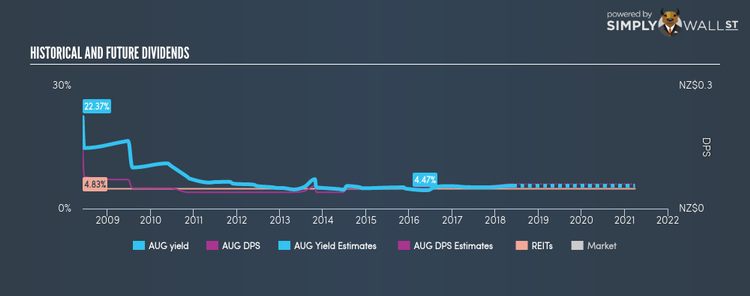Is Buying Augusta Capital Limited (NZE:AUG) For Its Upcoming $0.02 Dividend A Good Choice?

Attention dividend hunters! Augusta Capital Limited (NZSE:AUG) will be distributing its dividend of NZ$0.02 per share on the 18 June 2018, and will start trading ex-dividend in 7 days time on the 08 June 2018. Should you diversify into Augusta Capital and boost your portfolio income stream? Well, keep on reading because today, I’m going to look at the latest data and analyze the stock and its dividend property in further detail. See our latest analysis for Augusta Capital
5 questions to ask before buying a dividend stock
When researching a dividend stock, I always follow the following screening criteria:
Does it pay an annual yield higher than 75% of dividend payers?
Has its dividend been stable over the past (i.e. no missed payments or significant payout cuts)?
Has the amount of dividend per share grown over the past?
Is is able to pay the current rate of dividends from its earnings?
Will it have the ability to keep paying its dividends going forward?
Does Augusta Capital pass our checks?
Although REITs are expected to payout a high portion of the earnings, Augusta Capital currently pays out more than double its net income, which suggests that the dividend is not well-covered by earnings by any means. However, going forward, analysts expect AUG’s payout to fall into a more sustainable range of 84.77% of its earnings, which leads to a dividend yield of around 5.58%. Moreover, EPS should increase to NZ$0.07, meaning that the lower payout ratio does not necessarily implicate a lower dividend payment. If dividend is a key criteria in your investment consideration, then you need to make sure the dividend stock you’re eyeing out is reliable in its payments. Not only have dividend payouts from Augusta Capital fallen over the past 10 years, it has also been highly volatile during this time, with drops of over 25% in some years. These characteristics do not bode well for income investors seeking reliable stream of dividends. Relative to peers, Augusta Capital generates a yield of 5.58%, which is high for REITs stocks but still below the market’s top dividend payers.
Next Steps:
Now you know to keep in mind the reason why investors should be careful investing in Augusta Capital for the dividend. But if you are not exclusively a dividend investor, the stock could still be an interesting investment opportunity. Given that this is purely a dividend analysis, I recommend taking sufficient time to understand its core business and determine whether the company and its investment properties suit your overall goals. There are three key aspects you should look at:
Future Outlook: What are well-informed industry analysts predicting for AUG’s future growth? Take a look at our free research report of analyst consensus for AUG’s outlook.
Valuation: What is AUG worth today? Even if the stock is a cash cow, it’s not worth an infinite price. The intrinsic value infographic in our free research report helps visualize whether AUG is currently mispriced by the market.
Dividend Rockstars: Are there better dividend payers with stronger fundamentals out there? Check out our free list of these great stocks here.
To help readers see pass the short term volatility of the financial market, we aim to bring you a long-term focused research analysis purely driven by fundamental data. Note that our analysis does not factor in the latest price sensitive company announcements.
The author is an independent contributor and at the time of publication had no position in the stocks mentioned.

 Yahoo Finance
Yahoo Finance 
